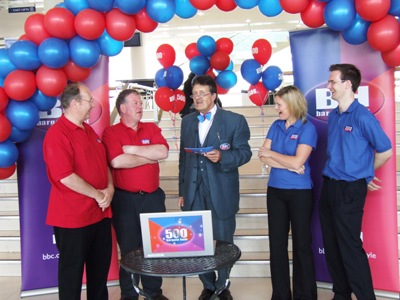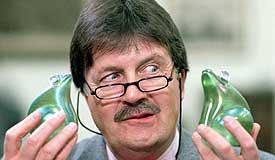Bargain Hunt
m |
|||
| Line 59: | Line 59: | ||
The show marked its 500th daytime edition on 15 October 2007. | The show marked its 500th daytime edition on 15 October 2007. | ||
| + | |||
| + | <div class="image">[[Image:Bargain hunt 500.jpg]]''Tim Wonnacott celebrates the 500th daytime show with regular experts (l-r) David Barby, Philip Serrell, Kate Bliss and Charles Hanson''</div> | ||
== Web links == | == Web links == | ||
Revision as of 08:41, 24 February 2008
Contents |
Host
David Dickinson (original host)
Tim Wonnacott (daytime, 24 February 2003 to present)
Co-hosts
Various antiques experts including Kate Alcock/Bliss, David Barby, James Braxton, Michael Hogben, Philip Serrell
Broadcast
BBC West for BBC 1, 13 March 2000 to present (daytime)
BBC West for BBC 1, 22 August 2002 to 13 November 2004 (primetime)
Synopsis
Essentially, a cheap version of The Great Antiques Hunt that they could do on a daily basis.
Two teams of two are given £200 to spend at an antiques fair to buy several items which they would later sell. An expert is assigned to each team to help them decide what to buy. The teams each have one hour to buy whatever they wanted with the money.
One week later the items purchased are sold in a real auction. The items are auctioned and the team which makes the most profit (or, more likely, the least loss) is the winner. If the team actually makes a profit then they get to keep whatever profit they made.
It's not startlingly original, but Dickinson is very watchable. It performed well enough against ITV's This Morning (sans Richard and Judy) to be promoted into a prime-time slot in 2002, the main difference being an increased buying budget of £500. Whereupon Tim Wonnacott took over the daytime version, and actually has settled in rather well. The primetime version pretty much ran its course and was axed in April 2005 but the daytime version continues.
Format tweaks
The show has gone through numerous variations, viz celebrity editions, live editions, live celebrity editions and a couple of US specials. The primetime show and the 1-hour live daytime editions have incorporated phone-in competitions (the removal of which conveniently allows for the statutory ad-breaks when the shows are repeated on UKTV Antiques & Gardening or whatever it's called.)
After Tim Wonnacott took over the daytime version, the longer (45-minute and 1-hour) shows included a "swap" option whereby each team could swap one of their three chosen items for another selected by their expert. There is now even a trophy (of sorts), namely a golden (oak) gavel on a stand, if the team makes a profit on all their items, and the initial budget has been upped to a dizzying £300 for each team, so now they can lose even more money than before. Most recently, the "swap" has been changed to a "bonus item", which the teams can choose - on the spot, during the auction - to add to their original three, having seen how well (or, more likely, how badly) their original items fared.
Key moments
The - all too frequent - shows where both teams lose a packet on their 'bargains'.
On one celebrity special for Children in Need a boxed 007 Aston Martin toy car made a profit over £2000 after being bought for £2.
The best result on an ordinary show we can find was a team who made a whopping profit of £399, after four items (including the bonus item) went into profit, including a very substantial gain on an Arts and Crafts-style mirror. Do let us know if you've seen a better result.
UKGameshows reader Oded Ross remembers the following, probably the greatest profit made on three items outside of the charity shows:
- In 2005, a team of two ladies headed by David Barby made a whopping £361 profit, which probably made them the first team to double the money given to them at the start of the show.Their items were: 3 berry silver spoons in their original box, dated around 1900 (bought for £70, sold for £110); A pair of Corinthian silver candle holders, also c. 1900 (£49 -> £70), and a rare flatback ceramic statue of King John signing the Magna Carta at Runnymede, bought for £120, and sold for an unprecedented (at least in the daytime shows) £420!! A swap was possible but not made. The auctioneer was Elizabeth Talbot. Curiously, in the very next show David Barby led another team to a golden gavel, albeit with a much smaller profit.
In 2007, expert James Braxton possibly set the record for the worst ever "bonus buy": some modern Italian glass he bought for £105 were sold for £12, a loss to the contestants of £93.
Catchphrases
Wonnacott version: "Come back for some more Bargain Hunt, yes? Yes!"
Trivia
The show marked its 500th daytime edition on 15 October 2007.
 Tim Wonnacott celebrates the 500th daytime show with regular experts (l-r) David Barby, Philip Serrell, Kate Bliss and Charles Hanson
Tim Wonnacott celebrates the 500th daytime show with regular experts (l-r) David Barby, Philip Serrell, Kate Bliss and Charles HansonWeb links
For more information about Bargain Hunt, including how the programme is made, visit bbc.co.uk/lifestyle
Bargain Hunt/David Dickinson fan site



